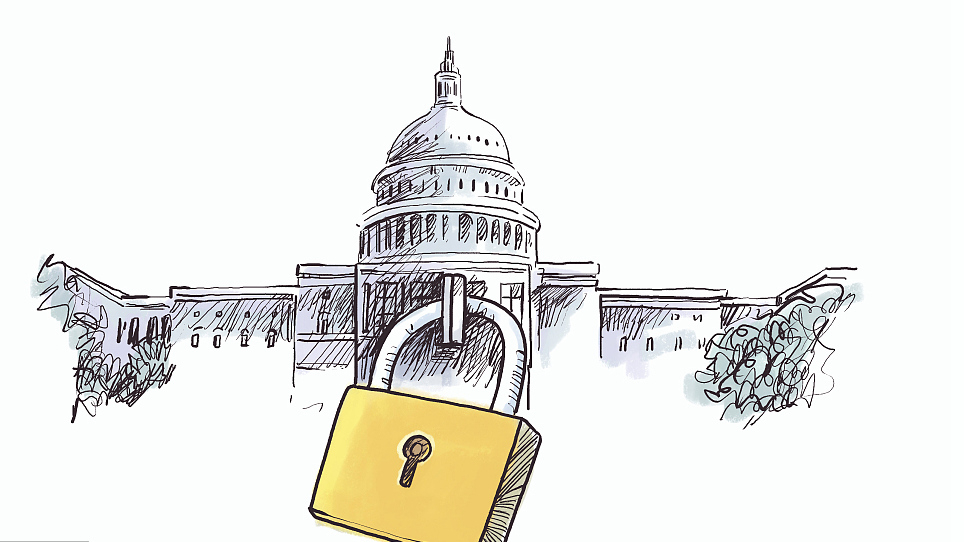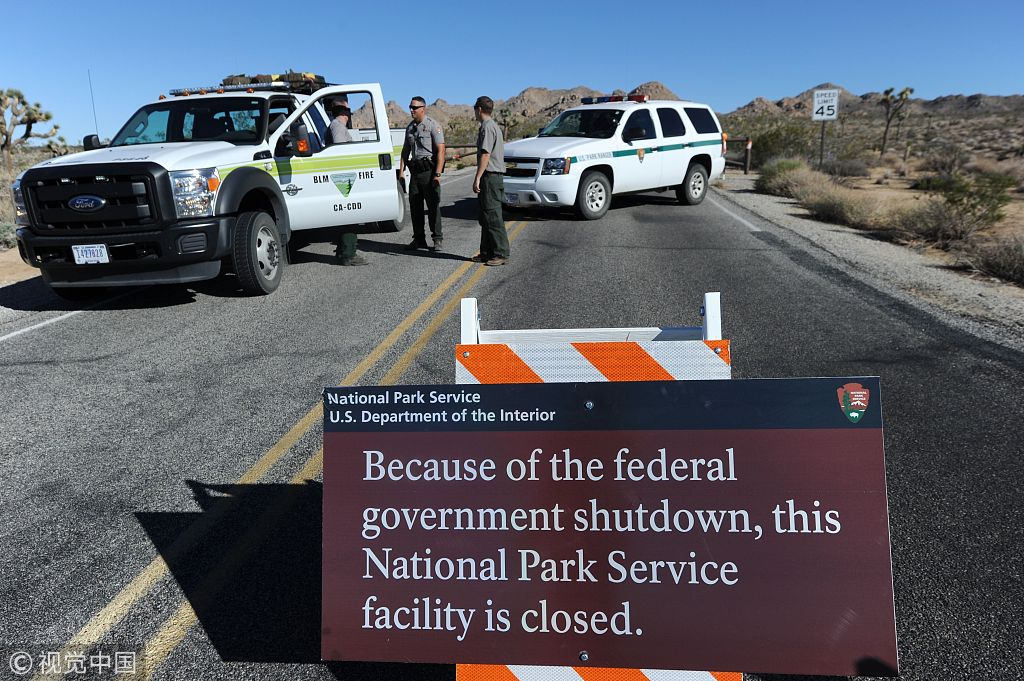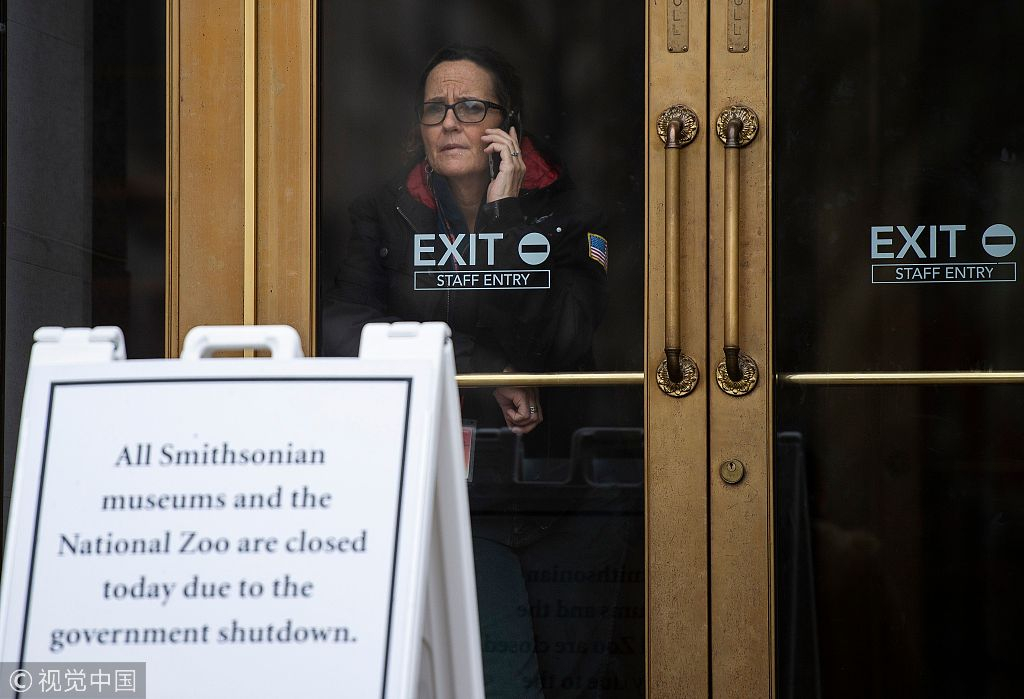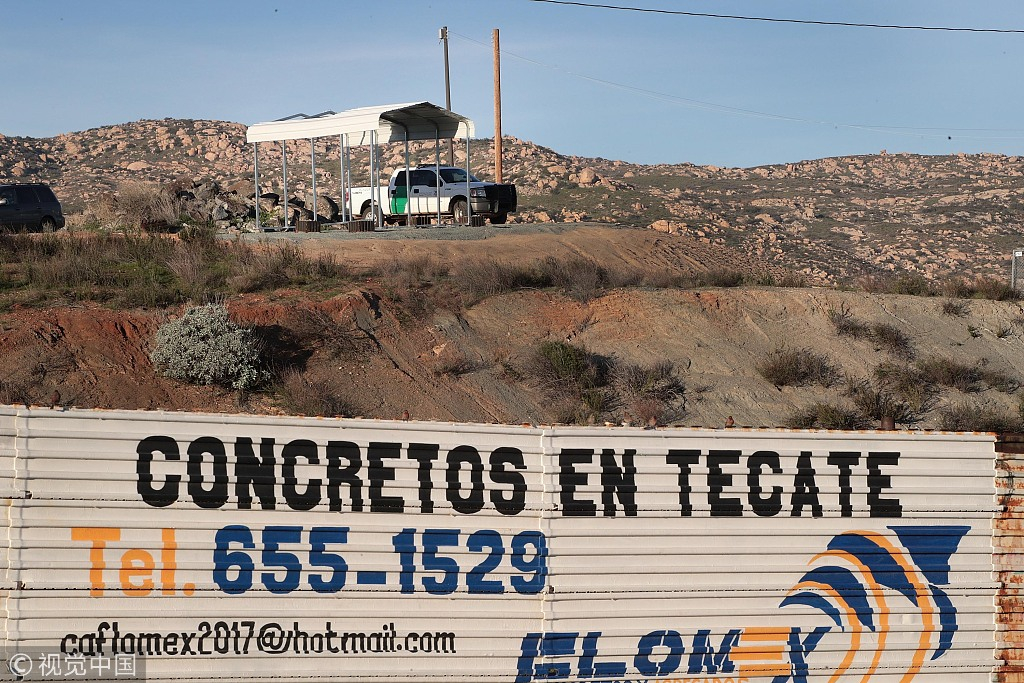
Opinion
18:02, 12-Feb-2019
Why Trump will probably accept a compromise deal on the shutdown
Pratik Chougule

Editor's note: Pratik Chougule is an independent consultant based in Washington DC. During the 2016 elections and he was the policy coordinator on the campaign of Donald Trump. The article reflects the author's opinions, and not necessarily the views of CGTN.
Press reports suggest that appropriators have reached an “agreement in principle” to avert another shutdown. If the deal passes Congress, Donald Trump will almost certainly sign it into law.
The last shutdown was the longest in American history and came with a hefty price tag of roughly 11 billion U.S. dollars. The longer it dragged out, the more Trumps' approval ratings dipped.
With the Mueller probe likely nearing completion, Trump cannot afford another shutdown.

U.S. Park Rangers stand at the closed gate to Joshua Tree National Park, in Joshua Tree, California on October 2, 2013, the second day of the US government shutdown. /VCG Photo.
U.S. Park Rangers stand at the closed gate to Joshua Tree National Park, in Joshua Tree, California on October 2, 2013, the second day of the US government shutdown. /VCG Photo.
The ongoing Special Counsel investigation of the Russian government's efforts to interfere in the 2016 presidential election may publish its report in the coming weeks. According to a CNN Poll conducted earlier this month, nine out of 10 Americans support the open publication of the report and roughly half of Americans think that it'll show that Trump's campaign colluded with Russia.
Several House Democrats have already flouted House Speaker Nancy Pelosi's instructions and introduced articles of impeachment against the president.
The farther Trump's ratings dip, the more likely that impeachment becomes an eventuality. According to a recent poll conducted by YouGov, Trump's approval rating is currently hovering around 42 percent among the general population, 40 percent among independent voters, and only eight percent among Democrats. These are dangerously low numbers for a president who might face impeachment in the middle of getting his reelection campaign off the ground. Trump has to juggle the demands of both his base and independents.
According to a Pew Research Center survey conducted during the shutdown, 58 percent of Americans opposed a border wall, while only 40 percent supported one. Of that 40 percent, 72 percent said that they would find it unacceptable if Trump ended the shutdown without border wall funding—which is precisely what happened. Trump's ideal step forward to turn around his approval ratings isn't clear, but it's not another shutdown.

A U.S. government employee talks on the phone as she looks out of a closed Smithsonian museum in Washington, DC on January 18, 2019. /VCG Photo.
A U.S. government employee talks on the phone as she looks out of a closed Smithsonian museum in Washington, DC on January 18, 2019. /VCG Photo.
During the last shutdown, despite all the political theater and high rhetoric about crisis and "American greatness," Republicans got no negotiating advantage out of the stunt. Largely, the American people blamed Republicans for the shutdown, not Democrats. According to a Washington Post-ABC News poll, 53 percent of Americans believe that Trump and Republicans were mainly responsible—including a majority of independents.
Another shutdown that goes nowhere would only further damage Trump's standing in the public eye. So, if Trump actually wants to negotiate funding for a wall, he'll need to pursue a different strategy.
Declaring a national emergency is probably off the table too for exactly the same reasons.
According to a Monmouth University poll, a whopping 64 percent of Americans believe that Trump should not bypass Congress and declare a national emergency in order to use military funding for a wall. Included in that figure are not only Democrats and independents, but even prominent Republican Senators, including Marco Rubio and Chuck Grassley. Moreover, a shutdown would give Trump's opponents substantial ammunition during his reelection campaign and set the stage for a dramatic court battle that could backfire if he loses—which is a very real possibility.

A U.S. border agent overlooks an advertisement that is painted on the Mexico side the border wall that separates the United States from Mexico on January 27, 2019 in Tecate, Mexico. /VCG Photo.
A U.S. border agent overlooks an advertisement that is painted on the Mexico side the border wall that separates the United States from Mexico on January 27, 2019 in Tecate, Mexico. /VCG Photo.
In a recent segment on Fox News, Judge Andrew Napolitano referenced President Harry Truman's attempt to seize steel mills during the Korean war and the Supreme Court case which prevented him from doing so: “The Supreme Court has made it very clear, even in times of emergency, the president of the United States of America cannot spend money unless it has been authorized by the Congress.”
With even Fox News analysts drawing unflattering historical parallels, it's unlikely that Trump will venture a second shutdown or declare a national emergency. It's simply not in his interest.
Trump's relatively conciliatory State of the Union address was an indication that he will not shut down the government again over the illusory goal of a border wall.
If Congress sends a compromise bill to his desk, Trump will probably sign it. Weighing on his mind is not only his immigration agenda, but also, potentially, his ability to survive an impeachment fight.
(If you want to contribute and have specific expertise, please contact us at opinions@cgtn.com)

SITEMAP
Copyright © 2018 CGTN. Beijing ICP prepared NO.16065310-3
Copyright © 2018 CGTN. Beijing ICP prepared NO.16065310-3